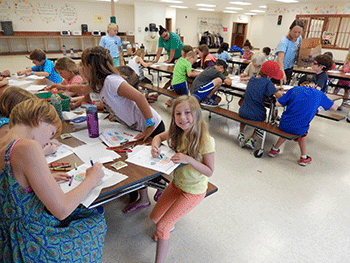 When it comes to education, the old adage “if you don’t use it, you lose it” withstands the test of time — especially over summer vacation. This August, teachers around the country will spend weeks reviewing material that students forgot from the previous school year. Known as summer learning loss, this phenomenon costs our schools, children and communities needed resources every year.
When it comes to education, the old adage “if you don’t use it, you lose it” withstands the test of time — especially over summer vacation. This August, teachers around the country will spend weeks reviewing material that students forgot from the previous school year. Known as summer learning loss, this phenomenon costs our schools, children and communities needed resources every year.
The results of summer learning loss are easy to point out, but the problem is much harder to prevent. Every summer, low-income children lose two to three months of math and reading achievement compared to their more affluent peers. For kids already struggling to keep up in the classroom, this ritual academic purge compounds summer after summer and makes dropping out four times as likely.
With more than 80 percent of low-income youth failing to read at grade level by the end of the third grade, millions of young people are already at risk of being left behind academically when they’ve only just started their education. If the benefits of each additional year of education are so well known (higher lifetime earnings, better health and longer life expectancy), why are we allowing summer learning loss to run rampant and leave students ill-prepared to compete in the classroom or an economy that demands more education, not less?
Thankfully, broader attitudes are changing about summer education. Communities now see the value of year-round educational access. Most importantly, parents, students and teachers are starting to realize what NRPA members have known for years: park and recreation agencies are a determined ally in the battle against summer learning loss, remedial lesson plans and lost class time.
This summer, kids are flocking to local parks and recreation centers to exercise, play with friends, and eat nutritious and free meals. Parks and recreation centers are doing their part to close the education gap by pairing healthy meals with targeted, high-quality, and research-based reading and math interventions. The lessons and tutoring sessions that accompany lunchtime meals at park and recreation sites have been proven to stem summer learning loss, increase retention rates and keep children on the path to success when they return to the classroom in the fall. Thanks to the hard work of park and recreation employees across the country, millions of kids who receive summer meals will return from summer vacation healthier and better prepared for school.
When children fall behind over the summer, more time, more effort and more money is required for them to catch up with their classmates. With school budgets already stretched to the maximum, and more students assigned to each class, teachers have little time to give struggling kids the personalized attention they deserve. By providing healthy meals at no cost, a safe space to play and quality education for kids, park and recreation sites across the country continue to be one of the best investments a community can make.
You can help!
Let your senators and representative know why they need to support summer meals and summer learning! Post to Twitter about the importance of summer meals and summer learning on July 30, 2015. Here’s how:
• Find your representative and senators and their Twitter handles by looking them up via zip code at GovTrack.us.
• Tweet at them using #SummerMealsAct, #SummerLearning and #CNR2015.
Sample Tweets:
• Support #SummerMealsAct & #CNR2015! Parks & rec support #SummerLearning through #SummerMeals! @NRPA_news [Tag Your Member of Congress]
• Help us keep kids full of knowledge & nutrition, [Tag Your Member of Congress]! Support the #SummerMealsAct & #CNR2015! #SummerLearning @NRPA_news
Oliver Spurgeon is NRPA's Government Affairs Manager.

